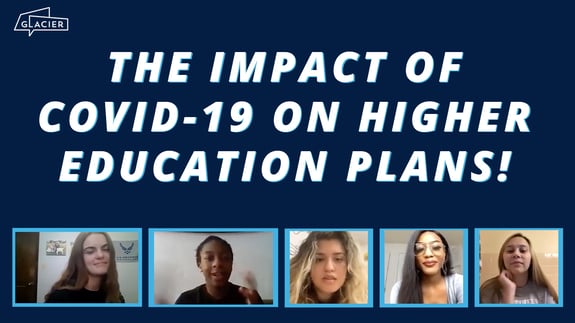- 4 min read -
Part 2:The Impact COVID- 19 is Having on Plans for Higher Education
We recently sat down with ten high school students from across the United States in an intimate focus group to discuss various topics related to COVID-19 and higher education media topics. You can watch the videos below!
Group 1:
Group 2:
In our most recent roundtable discussion we highlighted the impacts of COVID-19 on the day-to-day lives of high school students. We learned that while most of them continue to make school and studying part of their routine, the freedom to complete work on their own schedule and at a more flexible pace has reduced stress. With social restrictions forcing the cancellation of extra-curricular activities, students miss seeing friends and interacting, however, the additional free time has allowed them to focus on personal growth and relaxation.
Most students have kept a very positive outlook while adjusting to this new reality, but concerns over economic impacts and the adjustment to Post-Secondary education could not be ignored. The transition from high school to Post-Secondary can be stressful for a plethora of reasons: moving away from family & friends, financial commitments and, largely, academic performance. In addition, COVID-19 adds a lot of uncertainty to the immense amount of effort that goes into Post-Secondary planning.
To gain a better understanding of the impacts, we discussed the changes to Post-Secondary plans with our high school influencers.
Applications
For high schoolers moving into senior year, COVID- 19 has put a damper on the excitement of applying to different colleges and programs. While it seems unlikely that the impacts will still be present as current juniors are graduating, unique experiences like visiting campuses and interacting with recruiters have drastically changed. Mariah, a junior from Pittsburgh, explains, “I had a planned a bunch of College visits in the summer and I had hoped to make my final decision towards the beginning of my senior year.” Maddy, another junior from Maryland, echoed a similar sentiment, “Thankfully we still have a year to adjust but I was really looking forward to being able to go to some different colleges and check them out this summer. Most of them have cancelled all of the trips and meeting, so now I have to wait.” With recruitment activities being delayed, current high school students could be working with shorter research periods and tighter application deadlines. Despite this, they continue to present an optimistic outlook, free of added stress. “Hopefully it won’t affect my senior year; if it does then we’ll handle it when we get there but I am planning to apply for college and we’ll go from there.”
Financial Planning
For students who have already been accepted to institutions, the focus shifts to financial planning. The negative economic impacts of COVID-19, mainly limited work opportunities, add uncertainty to budgeting for Post-Secondary. “I am trying to work as much as possible for now and apply for scholarships. Hopefully I can save as much money as possible,” said Lena, a senior from Georgia.
Online Learning
The closure of schools have also forced students to adapt to online learning, and while using new technology and programs does not pose a challenge to this age group, receiving the same quality of education is a major concern. Of the students we spoke with, almost all expressed a preference for in-class learning as opposed to virtual. “I absolutely despise online learning; never will I ever take another online class,” said Mariah. “I agree with that completely, I am a face-to-face type of learner, right now I can only communicate with my teachers when they’re available, but when we’re in school we already have that same schedule. It is much better having a teacher with you; if you need help you can instantly go to them. When I have someone in front of me showing step-by-step it is much easier to learn,” Said Tamia. The stability, structure and familiarity of classroom learning is clearly still the top choice amongst students.
The prospect of online learning during the first semester of Post-Secondary has also left enrolled students very concerned. As Natalie explained, “A lot of colleges in the area are already talking about starting the fall semester online and I have told my parents if that happens, I will be taking the semester off or an entire gap year to work because I hate learning like this, I am struggling to learn with my online classes; I really don’t like it. I will definitely take the fall off because it is a lot harder to learn like this.” Courtney, a senior from Georgia who has already paid her enrolment deposit for the fall, felt the same way, “If we continue virtual/online learning, that would really stink because I don’t learn the best virtually and I think it would be awkward to meet people that way. If we end up online for the first semester, I will wish I had taken a gap year.”
Despite feeling less stressed about their schedules and workload during the quarantine, it is clear that having unimpeded access to the best possible education remains their top priority. Next, we will discuss the research and factors that go into making the decision on where this perfect education exists.
%20NextGrad.png?width=100&height=55&name=Primary-Blue%20(original)%20NextGrad.png)
%20NextGrad.png?width=100&height=55&name=Primary-White%20(original)%20NextGrad.png)

